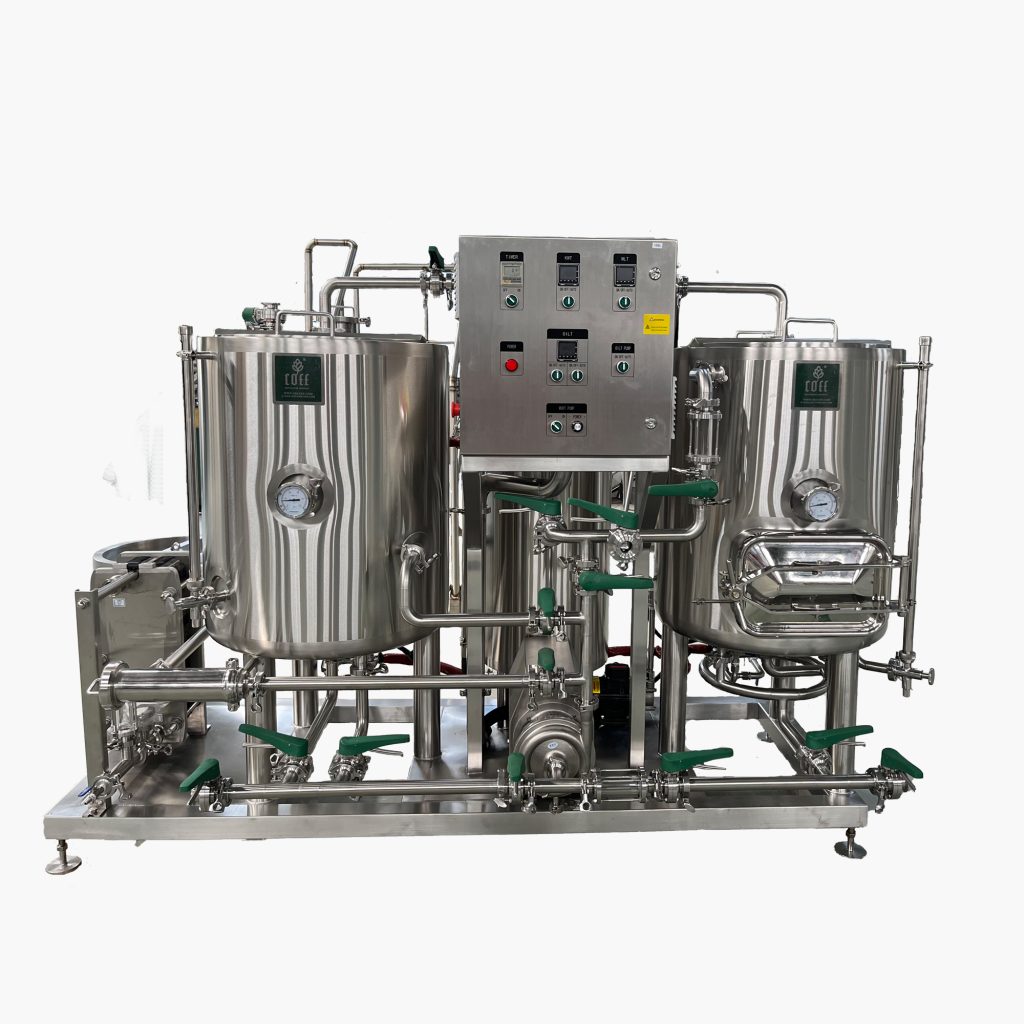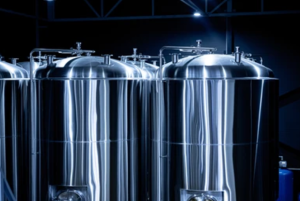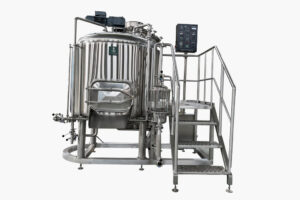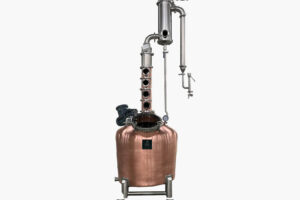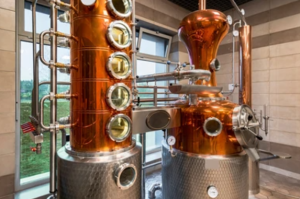COPYRIGHT © 2022 NingBo COFF Machinery Co., ltd. ALL RIGHTS RESERVED
Menu
Categories
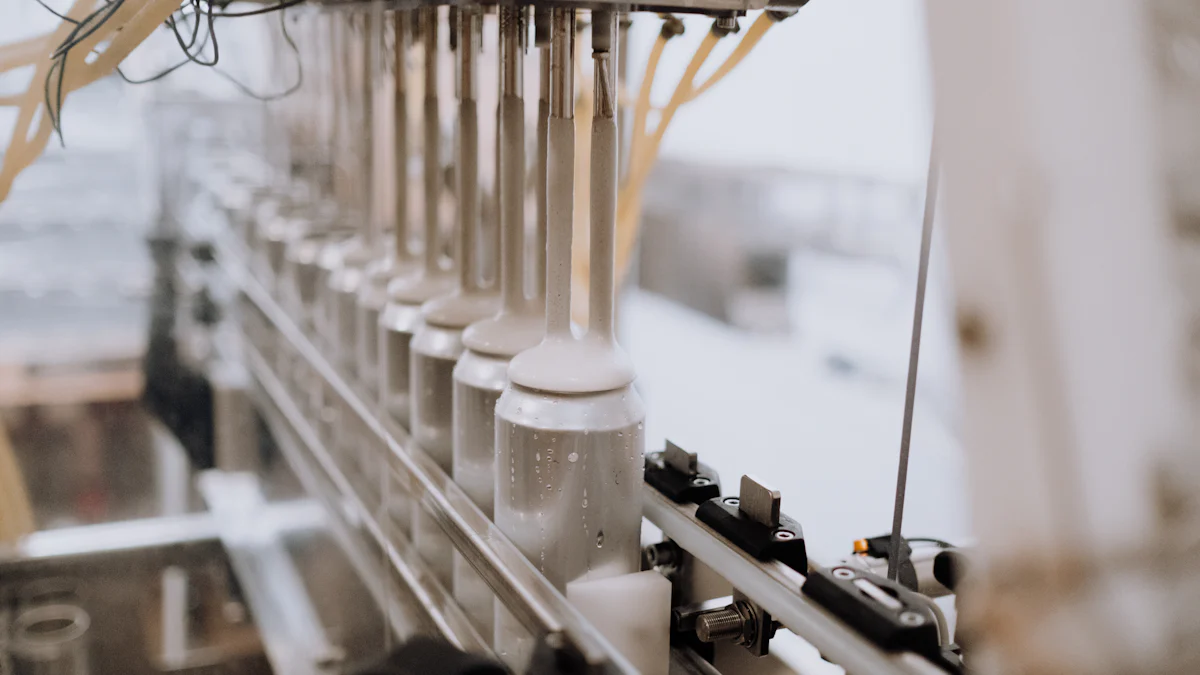
Beer engineering plays a crucial role in modern beer production. You can see how it enhances both beer quality and production efficiency. Innovations like the thermometer and hydrometer, introduced in the 18th century, revolutionized brewing by improving efficiency and attenuation. Today, advancements continue with systems like weight-based monitoring for fermentation. These innovations ensure you enjoy a consistently high-quality beer. As the brewing industry evolves, engineering remains at its core, driving improvements and ensuring that each sip meets your expectations.
Key Takeaways
- Beer engineering is essential for enhancing both the quality and efficiency of beer production, ensuring a consistently high-quality product.
- Understanding the brewing process—from malting to packaging—allows you to appreciate the craftsmanship behind every beer.
- Innovations like temperature control systems and fermentation modeling optimize brewing conditions, leading to better flavor and consistency.
- Automation and robotics streamline operations, reducing manual tasks and minimizing errors, which enhances overall production efficiency.
- Sustainable brewing practices, such as water conservation and waste reduction, are becoming increasingly important for minimizing environmental impact.
- Embracing advanced technologies and data analytics can help you make informed decisions, improving both the quality and sustainability of your beer production.
- Balancing traditional brewing methods with modern innovations is key to producing exceptional beers that honor their heritage while meeting contemporary tastes.
Overview of the Beer Brewing Process
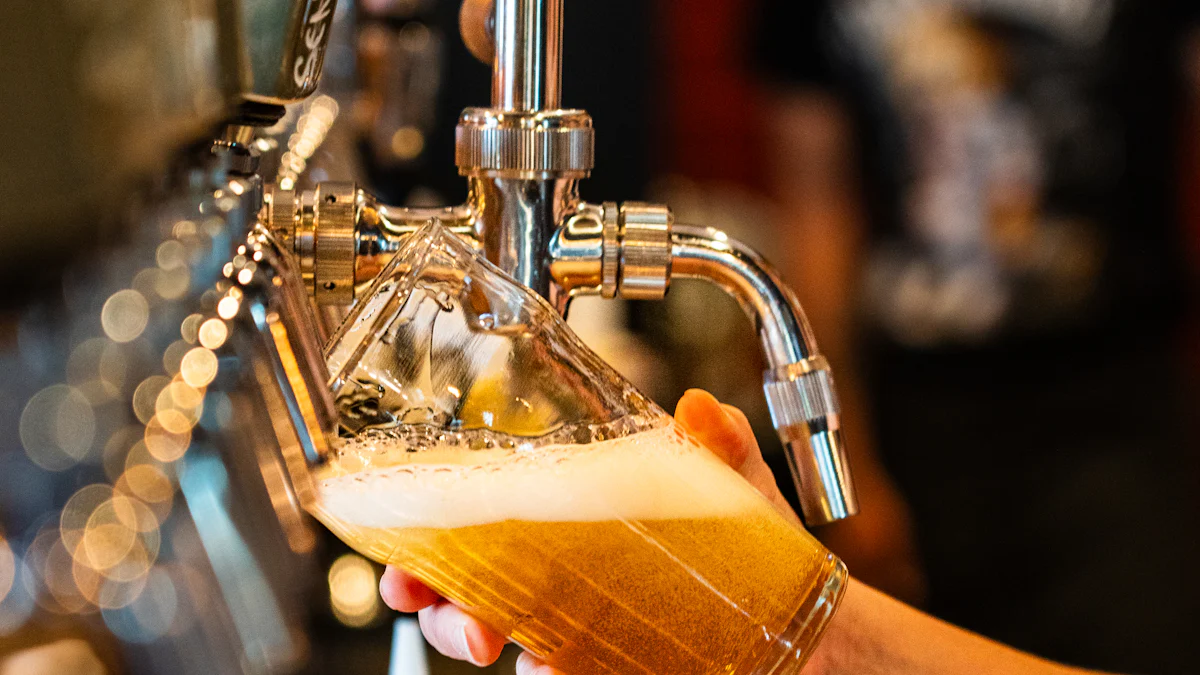
Understanding the beer brewing process helps you appreciate the craftsmanship behind every sip. This process involves several key stages, each contributing to the final product’s quality and flavor. Let’s explore the initial steps: malting, mashing, and boiling.
Malting
Malting marks the beginning of the brewing journey. You start with barley, which undergoes soaking to activate enzymes. These enzymes play a crucial role in converting starches into fermentable sugars. This conversion is essential because it sets the stage for fermentation, where yeast will later transform these sugars into alcohol. The malting process not only prepares the grains but also influences the beer’s color and flavor profile.
Mashing
Next, you move on to mashing. In this step, you mix the malted grains with hot water. This mixture creates a mash, allowing the enzymes to continue breaking down starches into sugars. The temperature and duration of mashing can significantly impact the beer’s body and sweetness. By carefully controlling these factors, you ensure that the resulting wort, or unfermented beer, has the desired characteristics.
Boiling
Boiling the wort is a critical phase in the brewing process. During this stage, you add hops, which contribute bitterness, aroma, and flavor to the beer. Boiling also serves to pasteurize the wort, eliminating any unwanted microorganisms. The length of the boil and the timing of hop additions can vary, allowing you to craft a beer with unique taste profiles. This step is vital for ensuring the beer’s stability and quality.
By understanding these foundational steps, you gain insight into how each stage of the beer brewing process shapes the final product. From malting to boiling, every action you take influences the beer’s flavor, aroma, and overall quality.
Fermentation
Fermentation stands as a pivotal stage in the beer brewing process. Here, you introduce yeast to the cooled wort, initiating a transformation where sugars convert into alcohol and carbon dioxide. This fermentation process not only produces alcohol but also contributes to the beer’s flavor and aroma. You can control the temperature and duration of fermentation to influence the final taste profile. By managing these factors, you ensure that the beer develops the desired characteristics, whether it’s a crisp lager or a robust ale.
Conditioning
Once fermentation concludes, you move to conditioning. This step allows the beer to mature, enhancing its flavors and smoothing out any harsh notes. During conditioning, you might notice the beer clarifying as sediments settle. This phase can last from a few weeks to several months, depending on the beer style. By allowing the beer to condition, you ensure a balanced and refined taste, ready for consumption.
Packaging
The final step in the brewing process is packaging. You transfer the conditioned beer into bottles, cans, or kegs, preparing it for distribution and consumption. During packaging, you may add carbonation to enhance the beer’s effervescence. Proper packaging ensures the beer maintains its quality and freshness until it reaches you. Whether you prefer a bottle or a can, this step guarantees that the beer retains its intended flavor and aroma.
Engineering Innovations in Beer Brewing
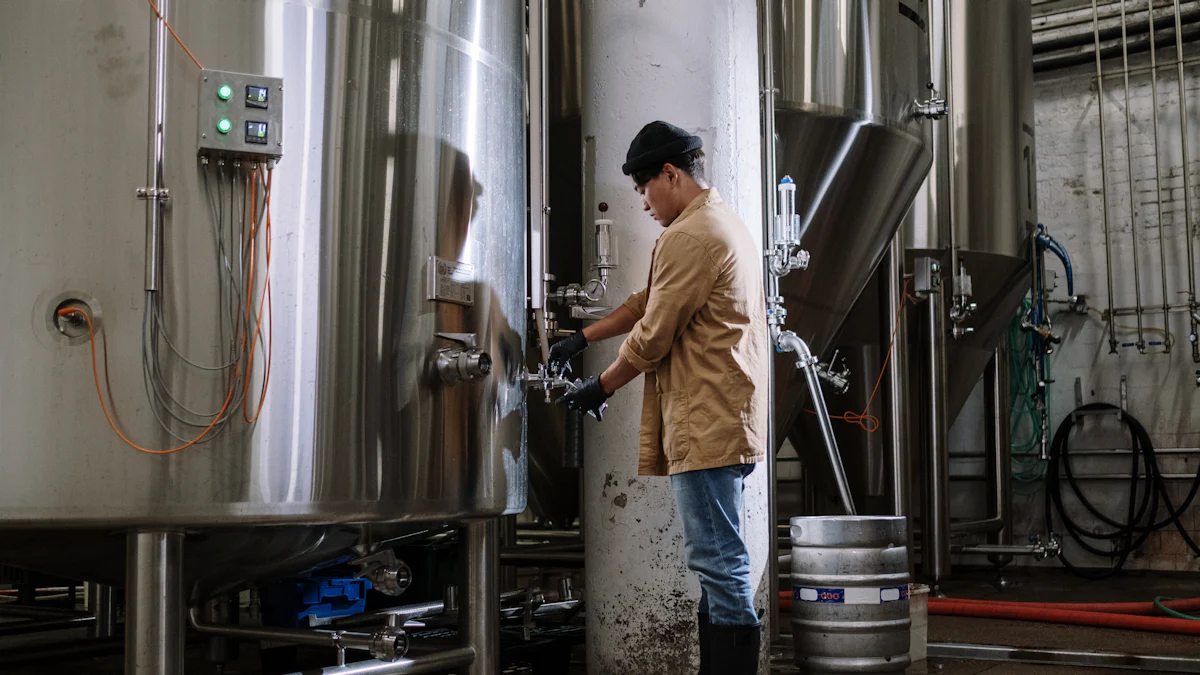
In the world of beer engineering, innovations play a pivotal role in enhancing the brewing process. These advancements ensure that each batch of beer meets high standards of quality and consistency. Let’s explore some key innovations that have transformed the brewing landscape.
Temperature Control Systems
Temperature control systems are essential in beer brewing. They allow you to maintain precise temperatures during various stages of the brewing process. This precision is crucial because temperature affects the activity of enzymes and yeast. By controlling the temperature, you ensure that the fermentation process proceeds smoothly, resulting in a beer with the desired flavor and alcohol content. Modern systems use sensors and automation to monitor and adjust temperatures, providing consistency across batches.
Fermentation Modeling
Fermentation modeling represents a significant advancement in beer engineering. It involves using mathematical models to predict and control the fermentation process. By understanding the relationship between yeast cells and fermentation, you can optimize conditions to achieve the desired beer characteristics. This modeling helps you manage the lag, exponential, and stationary phases of fermentation, ensuring that the yeast performs optimally. With accurate modeling, you can produce beer with consistent taste and quality.
Cooling Techniques
Cooling techniques are vital in the brewing process. After boiling, you must cool the wort quickly to prepare it for fermentation. Rapid cooling prevents unwanted microorganisms from affecting the beer’s quality. Advanced cooling systems use efficient heat exchangers to achieve the desired temperature swiftly. These systems not only enhance the beer’s stability but also improve energy efficiency in the brewing process. By implementing effective cooling techniques, you ensure that the beer retains its intended flavor and aroma.
Simulation and Technology in Beer Brewing
In the realm of beer production, simulation and technology have become indispensable tools. They enhance the brewing process by providing precision and efficiency. Let’s delve into how these advancements shape the industry.
Process Simulations
Process simulations allow you to visualize and optimize the brewing process before actual production begins. By using computer models, you can predict how different variables will affect the final product. This approach helps you identify potential issues and make necessary adjustments. For instance, simulations can reveal how changes in temperature or ingredient ratios impact the beer’s flavor and quality. By leveraging these insights, you ensure that each batch meets your high standards.
Automation and Robotics
Automation and robotics have revolutionized the brewing industry. These technologies streamline operations, reducing the need for manual intervention. Automated systems handle tasks like ingredient mixing, fermentation monitoring, and packaging with precision. Robotics enhance efficiency by performing repetitive tasks quickly and accurately. This automation not only speeds up production but also minimizes human error, ensuring consistent beer quality. By embracing these technologies, you can focus on innovation and creativity in your brewing endeavors.
Data Analytics
Data analytics plays a crucial role in modern beer production. By collecting and analyzing data from various stages of the brewing process, you gain valuable insights into performance and quality. Analytics help you track key metrics such as fermentation rates, temperature fluctuations, and ingredient usage. This information allows you to make informed decisions and optimize processes. For example, data analytics can identify trends and patterns that lead to improved efficiency and reduced waste. By harnessing the power of data, you enhance both the quality and sustainability of your beer production.
The Role of COFF in Brewing Innovation
In the ever-evolving world of beer production, COFF stands at the forefront of brewing innovation. As a leader in the industry, COFF provides cutting-edge solutions that enhance both the quality and efficiency of beer production. By integrating advanced technologies, COFF ensures that you enjoy a superior beer experience.
COFF’s Engineering Solutions
COFF offers a range of engineering solutions that revolutionize the brewing process. These solutions focus on precision and control, ensuring that each batch of beer meets the highest standards.
Temperature Control Systems: COFF’s systems allow you to maintain precise temperatures throughout the brewing process. This control is crucial for enzyme activity and yeast performance, directly impacting beer quality.
Simulation Technology: By utilizing simulation technology, COFF enables you to model and predict fermentation outcomes with precision. This approach ensures consistent flavor and quality in every batch.
Automation and Robotics: COFF integrates automation and robotics to streamline operations. These technologies reduce manual intervention, enhancing efficiency and minimizing errors.
COFF’s Impact on Quality and Efficiency
COFF’s innovations significantly impact both the quality and efficiency of beer production. By adopting COFF’s solutions, you can achieve remarkable improvements in your brewing operations.
Enhanced Beer Quality: With precise control over the brewing process, COFF ensures that each beer maintains its intended flavor and aroma. This consistency guarantees a high-quality product every time.
Increased Efficiency: COFF’s automation and data analytics optimize the brewing process, reducing waste and improving resource utilization. This efficiency translates to cost savings and a more sustainable production model.
By choosing COFF, you align yourself with a brand committed to excellence and innovation in the brewing industry. COFF’s engineering solutions not only elevate your beer quality but also enhance the overall efficiency of your operations.
Future Trends in Beer Engineering
The future of beer engineering promises exciting advancements that will shape the industry. As you explore these trends, you’ll discover how they enhance both the quality and sustainability of beer production.
Sustainable Brewing Practices
Sustainability is becoming a cornerstone of modern brewing. You can expect breweries to adopt practices that minimize environmental impact. Here are some key sustainable practices:
Water Conservation: Breweries are implementing systems to reduce water usage. By recycling water and using efficient cleaning processes, you help conserve this vital resource.
Energy Efficiency: Many breweries are investing in renewable energy sources. Solar panels and wind turbines power operations, reducing reliance on fossil fuels.
Waste Reduction: Breweries are finding innovative ways to repurpose waste. Spent grains become animal feed, and carbon dioxide from fermentation is captured and reused.
These practices not only benefit the environment but also improve the overall efficiency of beer production. By embracing sustainability, you contribute to a greener future for the brewing industry.
Advanced Brewing Technologies
Technological advancements continue to revolutionize beer production. As you delve into these innovations, you’ll see how they enhance precision and consistency in brewing.
Automated Control Systems: Automation ensures consistent brewing outcomes. With precise control over temperature and timing, you achieve repeatable results in every batch.
Fermentation Modeling: Using mathematical models, you can predict fermentation outcomes with accuracy. This technology helps you maintain consistent quality and flavor in your beer.
Process Optimization: Process engineers optimize brewing operations to maximize efficiency. By analyzing data and refining processes, you ensure high-quality beer production.
These technologies not only streamline operations but also elevate the quality of your beer. By integrating advanced systems, you stay at the forefront of brewing innovation.
Challenges in Beer Engineering
In the dynamic world of beer production, you face several challenges that require a delicate balance between tradition and innovation. These challenges not only test your skills but also push the boundaries of what is possible in brewing.
Balancing Tradition and Innovation
As a brewer, you often find yourself at the crossroads of tradition and innovation. The rich history of beer brewing, with its roots stretching back centuries, offers a wealth of traditional methods and recipes. For instance, the introduction of hops in northern Europe during the 13th century significantly improved the brewing process and beer quality. This historical advancement led to increased consumption and a concentration of the brewing industry.
However, modern advancements present new opportunities. The explosion of knowledge and technical advancements in homebrewing has given you access to the latest research. You can now estimate bitterness, color, and infusion temperatures with greater accuracy. The expansion of all-grain brewing techniques further exemplifies how innovation can enhance traditional practices.
To successfully balance these elements, you must respect the time-honored methods while embracing new technologies. This balance ensures that you produce beer that honors its heritage while meeting contemporary expectations.
Regulatory and Environmental Concerns
Navigating regulatory and environmental concerns is another significant challenge in beer engineering. As a brewer, you must adhere to strict regulations that govern everything from ingredient sourcing to production processes. These regulations ensure the safety and quality of your beer but can also impose limitations on your operations.
Environmental concerns add another layer of complexity. The brewing process is resource-intensive, requiring large volumes of water and energy. You must find ways to minimize waste and reduce your environmental footprint. Sustainable practices, such as water conservation and energy efficiency, are essential in addressing these concerns.
By staying informed about regulatory changes and adopting sustainable practices, you can overcome these challenges. This proactive approach not only ensures compliance but also contributes to a more sustainable future for the brewing industry.
The Impact of Engineering on Brewing
Beer engineering significantly influences the brewing process, enhancing quality, efficiency, and innovation. As you delve into this section, you’ll discover how engineering shapes the beer you enjoy.
Enhancing Quality
Engineering plays a pivotal role in elevating beer quality. By implementing precise temperature control systems, you ensure that the fermentation process occurs under optimal conditions. This precision allows yeast to perform efficiently, resulting in a beer with consistent flavor and aroma. Additionally, advanced filtration technologies remove impurities, enhancing clarity and taste. With these engineering advancements, you can produce a beer that meets high-quality standards every time.
Improving Efficiency
Efficiency in brewing is crucial for meeting demand and reducing costs. Engineering innovations streamline the beer brewing process, allowing you to produce more beer with fewer resources. Automation and robotics handle repetitive tasks, such as ingredient mixing and packaging, with speed and accuracy. This automation reduces human error and increases production rates. Furthermore, energy-efficient systems minimize resource consumption, making the brewing process more sustainable. By embracing these technologies, you optimize operations and improve overall efficiency.
Driving Innovation
Innovation drives the evolution of the brewing industry. Beer engineering introduces new technologies that revolutionize traditional methods. For instance, fermentation modeling uses mathematical models to predict outcomes, allowing you to experiment with different flavors and styles. This innovation opens up possibilities for creating unique beers that cater to diverse tastes. Additionally, simulation technology enables you to visualize and refine the brewing process before production begins. By fostering innovation, you stay ahead in the competitive beer market.
“Expanding opportunities for California craft breweries by allowing beer manufacturers to apply for a Beer Caterer’s Permit starting January 1, 2025.” This legislative change highlights the growing recognition of innovation in the brewing industry.
Engineering profoundly impacts the beer brewing process, enhancing both quality and efficiency. You see how innovations like automation and simulation technology drive improvements, ensuring each batch meets high standards. The future holds exciting potential for further advancements, promising even greater precision and sustainability in beer production. COFF plays a pivotal role in this evolution, offering cutting-edge solutions that elevate your brewing operations. By embracing these innovations, you contribute to a vibrant and dynamic industry, continually pushing the boundaries of what’s possible in beer production.
FAQ
What is beer engineering?
Beer engineering involves applying engineering principles to the brewing process. It enhances beer quality and production efficiency. By using technology and innovation, you can create consistent and high-quality brews.
How does temperature control affect brewing?
Temperature control is crucial in brewing. It influences enzyme activity and yeast performance. By maintaining precise temperatures, you ensure optimal fermentation, resulting in a beer with the desired flavor and alcohol content.
Why is fermentation modeling important?
Fermentation modeling uses mathematical models to predict and control the fermentation process. This helps you optimize conditions for yeast performance, ensuring consistent beer quality and taste.
What role does automation play in brewing?
Automation streamlines brewing operations. It handles tasks like ingredient mixing and packaging with precision. This reduces human error and increases production efficiency, allowing you to focus on creativity and innovation.
How does COFF contribute to brewing innovation?
COFF provides cutting-edge engineering solutions for the brewing industry. Their systems enhance temperature control, simulation technology, and automation. By choosing COFF, you ensure high-quality and efficient beer production.
What are sustainable brewing practices?
Sustainable brewing practices minimize environmental impact. They include water conservation, energy efficiency, and waste reduction. By adopting these practices, you contribute to a greener future for the brewing industry.
How do simulations improve the brewing process?
Simulations allow you to visualize and optimize the brewing process before production. They help identify potential issues and make necessary adjustments, ensuring each batch meets high standards of quality.
What challenges do brewers face in balancing tradition and innovation?
Balancing tradition and innovation involves respecting time-honored methods while embracing new technologies. This ensures you produce beer that honors its heritage while meeting contemporary expectations.
How can data analytics enhance beer production?
Data analytics provides insights into brewing performance and quality. By tracking key metrics, you can make informed decisions and optimize processes, leading to improved efficiency and reduced waste.

